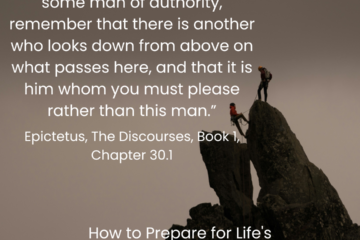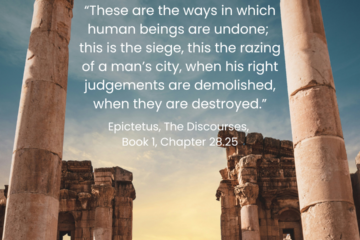
“Far more important is the law of life, that we must do what follows from nature.”
Epictetus, The Discourses, Book 1, Chapter 26.1
As with many things in Stoic philosophy, the theory can be explained simply. Here Epictetus manages it in one sentence. The difficulty lies in the application to life, and that’s what Epictetus focuses on throughout this discourse. The law of life can be summed up in two words: Knowledge and Acceptance.
We can follow what comes from nature when we know that nature doesn’t do anything bad. All of its actions flow from reason and logic, following each preceding cause. Therefore, if we want to live a good and harmonious life, then we must accept all that happens as being good and just.
Easier Said than Done
This law of life is easier said than done, and Epictetus acknowledges this. The rest of this discourse shows us how we should proceed and, more importantly, where to start. Knowing the right action and doing it presents two distinct challenges. But if we don’t know what this is, then we can never do what we must. The Stoics agree with Socrates that no one does wrong willingly; they act through ignorance of the correct way.
“The philosophers, therefore, first exercise us in theory, which is the easier task, and then lead us to the more difficult: For in theory there is nothing to oppose our following what we are taught; but in life there are many things to distract us.”
Epictetus, The Discourses, Book 1, Chapter 26.3
These days, reading and learning seem like a badge of honor, proof that we know all there is to know. Sharing quotes, smart facts, or specific knowledge on social media makes people sound smart and revered. Unfortunately, many of these knowledgeable people often forget to verify their information’s accuracy, not to mention living the words and wisdom they profess. But if you want to turn your life around and make a difference, then you need to take responsibility and put everything you know into practice.
No Quick Fix or Short-cut
Go online, open any social media platform and you’ll find lists of rules, steps, or techniques to follow for success. And it’s possible that they work or have some truth, but this piece of knowledge is just the start. The real journey begins now and will if practiced the right way, be a lifelong one. We see this happen in our coaching sessions as well, where our students learn Stoic practices but then run into the obstacles of life.

Get in touch with our coaches to help you overcome your obstacles.
Epictetus offers encouraging words:
“That is why it is difficult for a man to be a master of his own impressions there, where the disturbing forces are so great.”
Epictetus, The Discourses, Book 1, Chapter 26.10
The wise Stoic teacher from Nicopolis knows how difficult it can be, especially when we are surrounded by all the temptations that pull us from our natural path. Where luxury and extravagant food was for the elite in the old Roman days, we now have everything at the push of a button. Finding space without these distractions becomes increasingly challenging in our hyper-connected world.
The Law of Life is Not for Mere Show
“But as for a man who studies these things, and goes to the philosophers, merely for the sake of showing off at an entertainment how he understands hypothetical arguments, what other reason is he doing that for than to seek the approval of some senator who happens to be sitting beside him?”
Epictetus, The Discourses, Book 1, Chapter 26.9
Why do we study things? Is it because we want to understand the matter and apply it to life? Or are we merely looking for another diploma to hang on the wall? They add a title behind our name and let that piece of paper speak for us. Is that happening to modern philosophy as well? The doctors who know how to explain and examine life, how well do they practice what they teach?
Our Responsibility to Others
It is our responsibility to help those around us – those who might not know what the right way is. Therefore we cannot judge them, since they do not know. How can we blame someone for turning the wrong way when they haven’t received any direction? The best way to teach others is to show them. Set the right example and follow that of those ahead of you.
Socrates Has the Final Word
“The first step, therefore, towards becoming a philosopher is to become aware of the true state of one’s ruling faculty; for, when a person knows it to be in a weak state, he will not immediately employ it in great matters.”
Epictetus, The Discourses, Book 1, Chapter 26.15

The first step is to become aware of who we are and what state we are in. This doesn’t relate to theoretical things but to the law of life. Epictetus tells us that while we can easily refute an ignorant person in theoretical matters:
“In matters relating to life no one offers himself to be examined.”
Epictetus, The Discourses, Book 1, Chapter 26.17
Self-examination represents one of life’s most challenging tasks. Our ego resists confronting our weaknesses and failures. We must face that we are not perfect and have much work ahead. But this journey of self-discovery makes life special. We conclude with Epictetus sharing wisdom from the one person the Stoics held closest to the sage:
“Socrates used to say that an unexamined life is not worth living.”
Epictetus, The Discourses, Book 1, Chapter 26.18



0 Comments